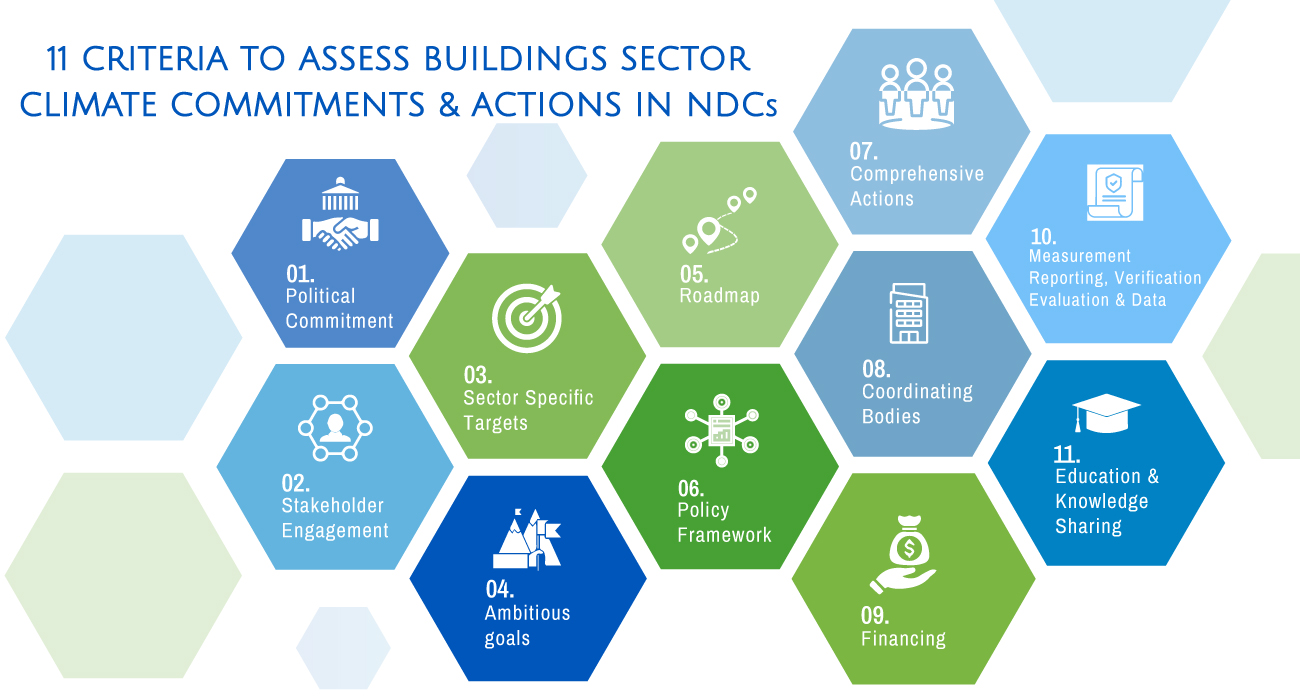Political Commitment
A political commitment is evident when a lead Ministry or department is cited as an organisation making the commitment on behalf of a country or jurisdiction. This is important because it communicates clearly who is taking public responsibility for making the commitment and therefore, for ensuring they are achieved. At this stage this criterion is not sector specific.
Stakeholder Engagement
This criterion identifies if a participatory process has been mentioned as leading to the commitments or actions being expressed in the NDC. Stakeholder engagement and inclusion is often implied, but some NDCs provide more detail than others on who was and continues to be involved and how they are engaged.
Sector Specific Targets
Sector Specific Targets set measurable actions for climate action that are related specifically to the buildings sector.
Targets are often expressed as the overarching national or subnational mitigation goal or target. These are required to be set in NDCs, but are seldom disaggregated by sector or related specifically to the buildings sector.
Ambitious goals
An Ambitious Goal is one that is:
- Aligned with the Paris Agreement Target of keeping Global Warming to 1.5oC relative to national circumstances.
- Aligned with Human Settlements Pathway goals including adaptation and resilience
- Aligned with and supports the most ambitious non-state actor buildings sector climate commitments in the country.
This criterion determines whether NDC commitments are aligned with AND support the most ambitious buildings sector commitments in a country.
Roadmap
It is important that actions are making a strategic contribution to a decarbonization roadmap. This is important because there are often multiple agencies that need to be involved in the implementation of NDC commitments, and roadmaps help to communicate and align priorities, milestones, monitoring and stakeholder engagement. This criterion therefore focuses on whether the actions being described as contributing to kind of a road map to get to zero-emissions, or to achieve the national mitigation goal.
Policy Framework
A policy framework should be in place in order to enable the implementation of NDC commitments to be enforceable. This criterion would be achieved if the commitment included a description of the mechanisms that make achieving the commitment legally enforceable.
Comprehensive Actions
Emission reduction opportunities in the buildings sector are large in aggregate and potentially the most cost effective to achieve. But they are highly dispersed across different building types, climate zones, the value chain and modes of occupancy.
This can be a key barrier to emission reduction opportunities, which require comprehensive actions to overcome these barriers, so that the opportunities can be harnessed.
This criterion assesses the range of actions that capture the largest whole of life mitigation opportunities in the buildings sector, as well as influence the mainstream just transition to resilient low-carbon construction value-chains and markets.
Coordinating Bodies
This criterion applies to commitments that mention the agency that is going to take responsibility for the implementation of actions and achieving the goals, indicates vertical and horizontal integration between implementing levels of government, and makes the governance framework clear.
Financing
The commitment should describe the means of financing the commitment, and/or the amount of finance and other resources needed to support implementing the actions set out in the NDC.
Measurement, Reporting, Verification, Evaluation and Data
This criterion is addressed when:
- The commitment is based on a measurable reportable and verifiable (MRV) baseline, scenario or target.
- Describes how progress will be evaluated, such as an intention to implement periodic monitoring and auditing of progress towards stated targets.
- Is transparent about the process of data collection and analysis.
This is an important aspect for being able to really account for the whole of life CO2-e mitigation that is being projected, and the contribution of the buildings actions to the overall mitigation goal. It is also important from the perspective of financing mechanisms for conditional commitments.
Education and Knowledge Sharing
This criterion applies when a commitment mentions strategies or initiatives to support knowledge-sharing, capacity building and/or formal education programs to enable stakeholders to implement stated actions.


